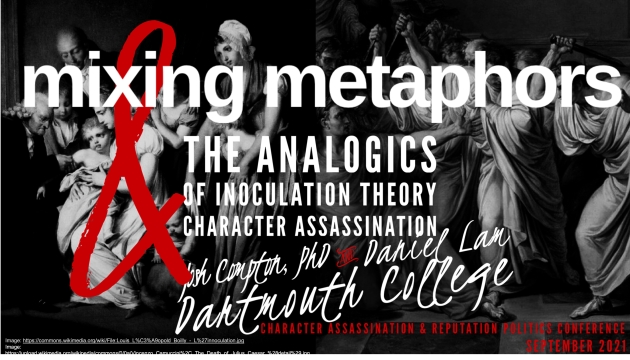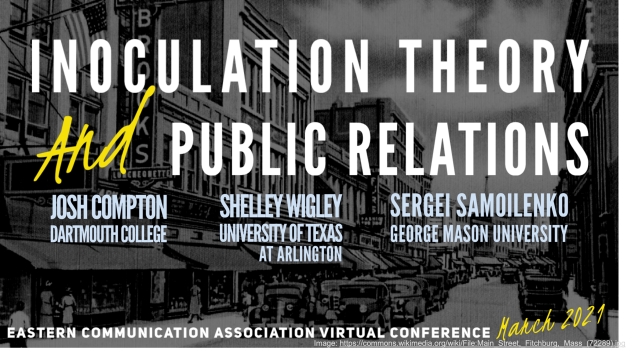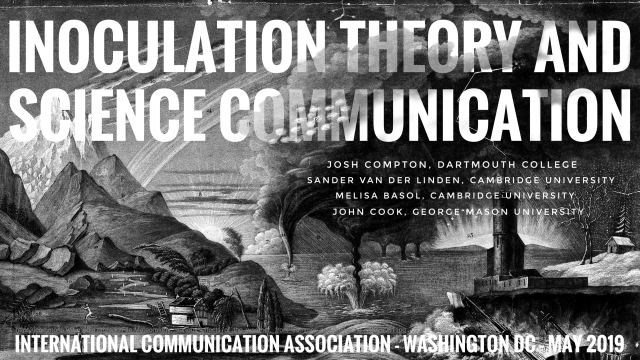Compton, J. (2025). Inoculation theory. Review of Communication, 25(1), 1-13. https://doi.org/10.1080/15358593.2024.2370373
Appel, R. E., Roozenbeek, J., Rayburn-Reeves, R., Basol, M., Corbin, J., Compton, J., & van der Linden, S. (2025). Psychological inoculation improves resilience to and reduces willingness to share vaccine misinformation. Scientific Reports, 15(1), 29830. https://doi.org/10.1038/s41598-025-09462-5
Capewell, G., Maertens, R., Remshard, M., van der Linden, S., Compton, J., Lewandowsky, S., & Roozenbeek, J. (2024). Misinformation interventions decay rapidly without an immediate posttest. Journal of Applied Social Psychology, 1-14. https://doi.org/10.1111/jasp.13049
Jones, D. N., Beekun, R., Schermer, J. A., MacDonald, K. B., & Compton, J. (2024). Inoculating against moral disengagement creates ethical adherence for narcissism. Personality and Social Psychology Bulletin, 0(0). https://doi.org/10.1177/01461672241276562
Clayton, R. B., Compton, J., Reynolds-Tylus, T., Neumann, D., & Park, J. (2023). Revisiting the effects of an inoculation treatment on psychological reactance: A conceptual replication and extension with self-report and psychophysiological measures. Human Communication Research, 49(1), 104-111. https://doi.org/10.1093/hcr/hqac026
Mason, A. M., Compton, J., & Spencer, E. A. (2023). Understanding individual differences in the dimensions of 'vestedness' within Midwestern populations toward the novel coronavirus (COVID-19) during early-stage pandemic onset. The Midwest Quarterly, 64(3), 242-261. https://www.proquest.com/scholarly-journals/understanding-individual-differences-dimensions/docview/2810209950/se-2
Mason, A. M., Compton, J., Tice, E., Peterson, B., Lewis, I., Glenn, T., & Combs, T. (2023). Analyzing the prophylactic and therapeutic role of inoculation to facilitate resistance to conspiracy theory beliefs. Communication Reports. https://doi.org/10.1080/08934215.2023.2256803
Mason, A. M., Spencer, E. A., Westhoff, M. C., Livingston, K. M., & Compton, J. (2023). Surveilling the web, mobile, and language accessibility of Communication's digital presence within institutions of higher education globally. Journal of Communication Pedagogy, 7, 130-147. https://doi.org/10.31446/JCP.2023.1.09
Compton, J. (2022). Inoculation theory as rhetorical strategy in The Evidence at Large (1805). Western Journal of Communication. https://doi.org/10.1080/10570314.2022.2153616
Compton, J., & Compton, J. (2022). Playoff losses, mayoral politics, image repair,and inoculation: Open letter sport communication. Communication & Sport. https://doi.org/10.1177/21674795211067471
Compton, J., Ivanov, B., & Hester, E. (2022). Inoculation theory and affect. International Journal of Communication 16, 3470-3483. doi:1932-8036/2022FEA0002
Compton, J., & Kaylor, B. (2022). The Devil and Vaccination and inoculation theory: Health communication, parody, and anti-vaccination rhetorical strategy. Journal of Communication and Religion, 45(3), 37-51.
Compton, J., Ivanov, B., & Hester, E. (2022). New directions for inoculation theory and affect research. STAM Journal 52(1), 1-27. Available: https://speechandtheatremo.org/journal-archive/
Compton, J., Wigley, S., & Samoilenko, S. (2021). Inoculation theory and public relations. Public Relations Review47(5). https://doi.org/10.1016/j.pubrev.2021.102116
Compton, J. (2021). Threat and/in inoculation theory. International Journal of Communication 15, 1-13. doi:1932–8036/2021FEA0002
Compton, J., van der Linden, S., Cook, J., & Basol, M. (2021). Inoculation theory in the post-truth era: Extant findings and new frontiers for contested science, misinformation, and conspiracy theories. Social and Personality Psychology Compass (15), 1-16. https://doi.org/10.1111/spc3.12602
Clear, S. E., Dimmock, J. A., Compton, J., & Jackson, B. (2021). How do inoculation messages work? A two-study mixed-method investigation into inoculation mechanisms. Asian Journal of Communication 31(2), 83-104. https://doi.org/10.1080/01292986.2021.1888306
Compton, J. (2020). Prophylactic versus therapeutic inoculation treatments for resistance to influence. Communication Theory 30(3), 330-343. https://doi.org/10.1093/ct/qtz004
van der Linden, S., Roozenbeek, J., & Compton, J. (2020). Inoculating against fake news about COVID-19. Frontiers in Psychology. https://doi.org/10.3389/fpsyg.2020.566790
Compton, J., & Mason, A. (2020). Narrative and the inoculation theory of resistance to influence. In S. S. Dunn & G. Nisbett (Eds.), Innovations and implications of persuasive narrative (pp. 23-42). Peter Lang Publishing.
Compton, J. (2020). Inoculation against/as character assassination. In S.A. Samoilenko, M. Icks, J. Keohane, & E. Shiraev. (Eds.), The Routledge handbook of character assassination (pp. 25-35). London, New York, NY: Routledge.


